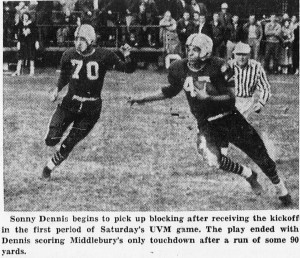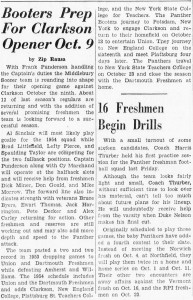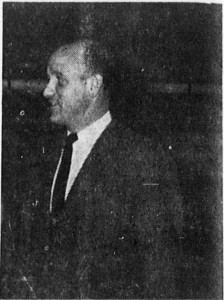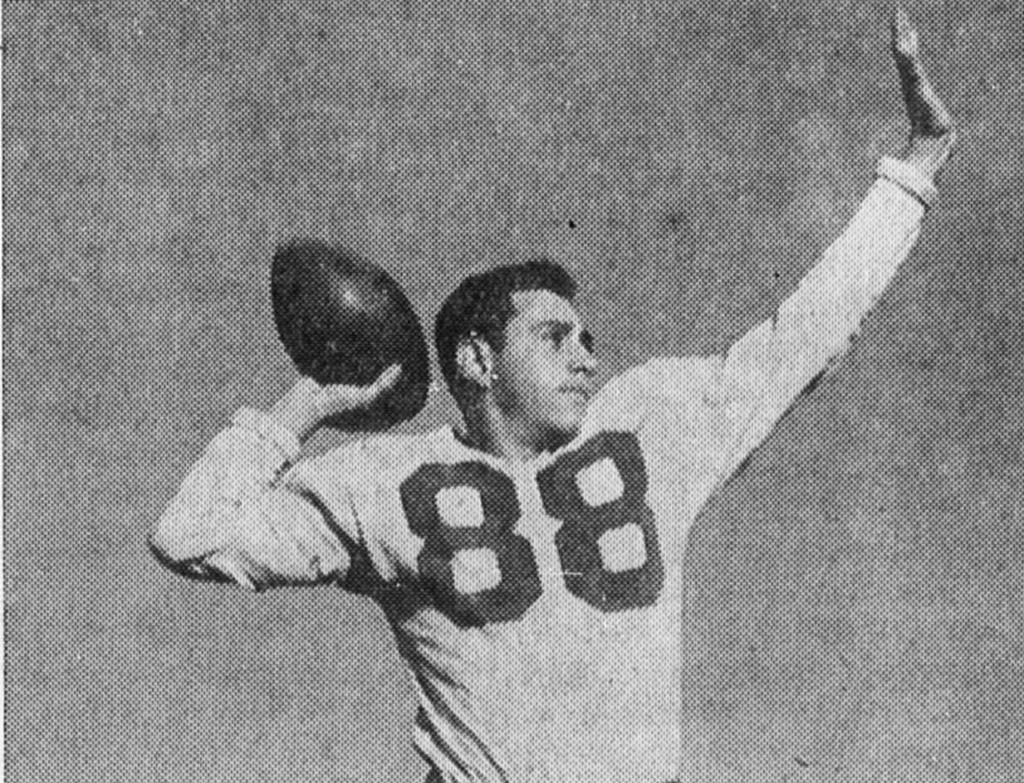Rosario “Zip” Rausa ’57 was a three-sport athlete at Middlebury, dividing his time between the grid-iron, the basketball court and the baseball diamond. After graduating Rausa served as a pilot in the Navy before becoming an editor for Naval Aviation News, which he still edits to this day. He played under head coach Tony Lupien, and played alongside former greats Sonny Dennis, Tom Hart and Charlie Sykes.
Damon Hatheway: You came to Middlebury right after a number of difficult years for the [men’s basketball] program and then right before a number of one-win teams in the 60s. How did you choose Middlebury and what changed during the 50s?
Rosario “Zip” Rausa: I was originally going to go to Holy Cross and I wouldn’t be able to make the [basketball] team at Holy Cross. But my father was a baseball umpire in the Pony League, and this was AAA baseball. I was a catcher in baseball and they allowed me to catch batting practice one day and the manager of the team was Tony Lupien, who became the Middlebury coach! He was a good friend of my father’s and to make a long story short, just before the deadline for getting into school was about to pass, Tony intervened and I got into Middlebury. [So] that’s how I ended up getting there.
DH: What’s the longer version of the story, if you don’t mind me asking?
ZR: There really isn’t a longer version. I loved sports — I didn’t care too much about studying. I wanted to go where I could play, but I didn’t think of any other options other than Holy Cross. I was brought up as a Catholic and at one point in life I thought I might want to become a priest. But that faded real quick when I got to catch batting practice there in that Pony League. Tony intervened with the admissions director because of the deadline of applications and went to bat for me. And I got in! I went out for football and played on the football team [in the fall] and then when basketball [season] came, I didn’t expect to go out for the varsity [team], and I didn’t — I played on the JV team. My roommate Charlie Sykes was the superstar — we were the same age, same class — he went out and started for the varsity right away.
DH: I have quite a few questions about Charlie Sykes, but first I want to touch upon Tony Lupien. What kind of coach was he and what kind of impact did he have on the program?
ZR: He had a very positive impact all the way. He had been a professional baseball player — he was with the Boston Red Sox and a couple of other teams. So he knew all about sports and he knew the mentality of athletes. And of course he had a couple of ringers when I got there: we had Tom Hart and Sonny Dennis and then of course Charlie [Sykes]. But let me tell you [about] a couple of his [coaching] innovations that I [haven’t] seen anywhere before or since, but that I thought they were very successful. Playing against a zone defense was kind of difficult, but Tony came up with [a new offense]. Imagine the 2-2-1 setup on the court. You’re going against the zone, you’ve got two guards [at the top], two forwards on the [wing] and the center roaming underneath [on] the baseline. So the way the play was started is the guard on the left-hand side would hit the ball hard, pass it to his other guard on the right, which was a signal for one of the forwards to dash immediately into the foul line. And then the [guard] that tossed the ball in, hurried down to become the guard on the left-hand side, so now you have a 1-3-1 setup. You would stay with that until it didn’t work for a while, and then go back to the other innovation. But that way of going from a 2-2-1 to 1-3-1 did a lot to confuse the defenses and it also gave Tom Hart and Sonny Dennis a little more operability, and of course Charlie as well. The other innovation was — and this I did get to play with the varsity in the later years… Tony would designate four guards to be chasers and he would say to us on the bench ‘Go in there and give me a good two minutes.’ And that’s all it was. When you went in there, your job was to run all over the backcourt trying to steal the ball and give every ounce of your energy toward that effort. He didn’t want us to handle the ball or score anything — just to harass the other team. That worked pretty well for a while.
On top of that, Tony was easy to get along with. He knew he had a couple of major stars in Charlie, Sonny and Tom Hart. And the only one who really gave Tony any trouble — and it wasn’t any real trouble — was Tom Hart. Tom Hart was the nation’s leading rebounder. I’ll never forget the game … I was sitting at the end of the bench. Tony wanted Tom Hart to rebound and put the ball back in or just rebound — he didn’t want Tom to shoot from anywhere other than close in. I could tell that [Tom] was itching to shoot some one-hander from, oh, about the 15-foot mark from the basket. It was almost like watching a slow-motion movie: you could see Tom — he got a rebound and he dribbled it back out, just outside the top of the key, and Tony, who had a very deep, baritone voice, could sense that Hart was going to throw up a long, one-hander. So he started repeatedly saying, “Don’t do it, Tom. Don’t do it.” Well Hart threw it up, and it swished through the basket. Tony was irritated and looked at us down the bench and said, “I don’t care if that ball went in or not, he was not to take that shot.” Well we got a pretty good laugh out of that, and it didn’t happen more than once. He was a great organizer, very smart guy and I don’t think I ever saw him lose his temper genuinely.
When we had to go out to [upstate] New York to play St. Lawrence and Clarkson, Tony worked out a deal with a couple of limousine guys in Burlington. We would get in these limousines and drive across what I called the “White Tundra” to Clarkson and St. Lawrence. I wasn’t in the car when this happened, but one night when they were crossing a railroad track — and I believe it was dark — the limousine stalled on the tracks, and Tony was in that car. And so the story goes, Tony said, “Everybody get out — we have to push this car across the railroad tracks. Because the Montreal Limited would be there in two minutes.” Anyway, they got across the tracks safely and got in the car and proceeded the rest of the way.
And there’s another story — I’m not sure if Tom Hart came from a wealthy family or not, but he had his own car: it was a four door, blue, mercury sedan — very spacious. And Tom was given permission to drive to some of the games. One of his favorite things to do was [while] he was driving along on a big highway — he would never do this on a two-lane road — and he would shrink down in the driver’s seat so that you could not see him from another car. Jim Wagner, who was a good guard on our team, would control the steering wheel by holding it at six o’clock position and keep us on a steady course on the highway. Then they [would] slow down enough so that another car driven by one of the players would pull up alongside to see what was going on and it would look like there was no one in the driver’s seat. Everybody would be startled in the other car and that lasted for a little bit, but we talked about that for years. That was Tom Hart’s favorite trick.
Tony lived three hours away [from campus] and he would spend nights sleeping in the Field House. He would go home on weekends or during vacations. He was well-liked on campus and he wanted to win. Winning wasn’t everything for Tony, but it was the best thing. He was able to take those three talented guys, Sonny Dennis, Tom Hart and Charlie Sykes, and he blended it in with a couple of guards who were pretty good — Johnny Hoops was excellent — and we finally turned it around and had a winning season. Tony let those of us who were on the JV to sit on the bench during some of these games and we went down to play Dartmouth, and that to us was big time basketball. And Middlebury almost pulled off the upset of the year. I think we lost by two or three points in the last minute or so. Charlie Sykes was kind of a hero in that game.
DH: I have a note about Sonny Dennis’s free-throws against UVM. He made two free throws in the final seconds to beat UVM 75-74 he had 33 points in the game I think?
ZR: That might have been before I got there. But I believe it. I played football with Sonny. I wish they had some movies of the old games, just to watch Sonny Dennis run. He ran like a deer — he had huge, muscular thighs, but his calves were narrow… I never could understand that. He could drive, he could break some tackles, but if you got him in the open field you were never going to catch him. He was a marvel to watch. And Sonny Dennis was a good guy too. I understand that [he] did something in civilian life that was quite heroic. I think there was a civil rights problem in New Jersey and he managed to quell a potential riot using his personality and his skill. It could have turned out bad, but he was quite a hero that day.
 DH: You’ve spoken about Tom Hart, Sonny Dennis, and Charlie Sykes. What was so special about those guys and how did Tony Lupien attract those kinds of players to Middlebury?
DH: You’ve spoken about Tom Hart, Sonny Dennis, and Charlie Sykes. What was so special about those guys and how did Tony Lupien attract those kinds of players to Middlebury?
ZR: That last question is a complete mystery to me, of course here were no Division I, II, or III setups in those days. I was amazed that the three of them came to Middlebury. They were certainly capable of being [recruited] by Ivy League teams if not bigger — and I never found out why. Charlie was one of the top players in New England prep schools and I can’t imagine someone not trying to recruit him… And especially Tom Hart! I think Tom was only 6’4’’, but he had enormous arms. You know when you go to marine land and the attendant holds out a piece of fish for the dolphin and it jumps up and grabs it? That’s what it looked like whenever [Tom Hart] went up for a rebound: he just went way up high and came back down. But it’s a mystery, and there are probably specific reasons in each case, but we were sure glad to have them. We beat some good teams in those days. I can’t imagine that happening in this day in age; they slipped through the recruiting process I guess.
DH: What was it like having that quality of athlete on such a small campus like Middlebury and what was the relationship between the team and the student body?
ZR: As I recall, we filled out the Field House for games when Tom and Sonny were there. Tom dropped out one year so the magic of the triumvirate disappeared for a while because he was having trouble with grades or something. I think they were loved. Incidentally, we had a guy who became a famous sports announcer, Gerry Gross, who would broadcast the games from a booth opposite the main tiers of seats. Gerry ended up going out west and he was broadcasting Pacific Coast League games, and very early in his career he was handling the East-West game. And he knew Tony better than anyone. When I went to that “Pony League” baseball camp, Gerry was the groundskeeper. They spent the whole summer together, playing baseball and cleaning the field and watering it down and that sort of thing.
DH: Back in the 50’s how was the relationship between athletics and academics at Middlebury? Was there any tension between the two groups? Was it difficult to manage athletics and academics at the same time? What was that dynamic like?
ZR: Absolutely not — there was no problem whatsoever. We had one professor, an English professor — thank God, he saved my life. Curly Perkins was his name. He went to every practice and every home game for all the sports — [he] just loved it immensely. Everybody feared the comprehensive exam — and I still fear the dam thing, even though it’s a long time later. You would go into a small room, one of the offices of one of the professors there. Perkins headed the thing, because the other guys grilled me. I did fair, but I could tell that they really didn’t like my performance. But Professor Perkins, when it was his turn, he always asked me a question he knew I could answer. I think I got the lowest grade possible, but I passed and I graduated. I was lucky I played football, basketball, baseball. Perkins gave the edge to get through, but sports made the difference.
DH: You were teammates with Charlie Sykes for four years — what kind of player and person was and is he?
ZR: Charlie Sykes, in my estimation, is one of the best persons who ever lived. Jim Wagner, one of our [teammates], during his senior year, he was asked by a person who was recruiting for a company, and they were asking questions about Charlie Sykes, and Charlie and I, we worked in a dining hall. Charlie was a dishwasher. This person who was seeking information on Charlie Sykes captured Jim Wagner and asked him, “What do you think of this Charles Sykes?” And Jim Wagner said, “You could ask the president of the College or the lowest ranking cleaning lady in Gifford Hall and you would get the same answer: he’s one of the best people that you could ever meet.” [Charlie] is a very easy-going guy — I always remember he slept well. He slept so wall we called him “Father Time.” He was kind to everybody — I never saw him mad. Not only that, he was smart. Charlie was a superb student; he was a very serious-minded individual. And he lived the life to prove that. He was in the army for a while and then he ended up with CARE. He went all over the world helping to feed people and he rose to the rank of number two [in the organization] before he retired. He’s a supreme being and I really felt privileged to be his roommate.
And we had another roommate — his name was Carl Scheer. And Carl became the General Manger of the Denver Nuggets and he’s a friend of Michael Jordan’s and he now runs the [Community Relations] program for the Charlotte Bobcats.
As far as Charlie goes, you couldn’t find a nicer person — everybody loved him. He was also an excellent track athlete. So was Sonny Dennis — I think Sonny could probably win a track meet all by himself.
DH: What moments, games or accolades stand out from your career?
ZR: In basketball there was one. I was a substitute until my senior year, and then I played a lot, but of course we lost a lot. We played at a small court up at St. Lawrence, and I grew up on a small court, so I felt at home, and I got to make quite a few set shots from the outside. I had 28 points that night and I haven’t done that before or since.
DH: You returned to campus last year [with Charlie Sykes] and were recognized [at halftime]. What is your relationship now with the basketball program?
ZR: I followed it a lot towards the end of last year because they had a good chance of going to the Final Four and all that. This year I haven’t done that much, but I checked through it just the other day and looked up some information. And I will do it now, because Charlie and I were treated like royalty up there. I wish I had more time to talk to the players, but I did have a good visit with coach Brown — I was very impressed with him.
DH: And finally, what were you able to take from your basketball and football career at Middlebury into your post-college career?
ZR: The experience with sports helped me a lot, especially when I went into the Navy. I was in the aviation program and I wanted to earn my wings so badly that it made press too hard. But I got through the primary phase and I went to a place called Whitings Field in Florida for what they call “Intermediate Training.” And this is where you either make it or break it. And they had a baseball team. And the captain of the base and the Executive Officer were huge baseball fans; they came to all of the games. I got the word that if I wanted to play baseball and if I got in trouble in the training program, they would help me out! Well I never needed that help, but I played baseball because that was the Ace up my sleeve in case I ever had a bad flight!
We had a great baseball team and a great coach. And to show you how important it was, one day, I’m down at the hanger getting ready for a flight, and I know that I’m going to be in trouble because we had a game that day right on base. It was supposed to start at one o’clock. And I knew that my flight wouldn’t get back on time to get down there for the start of the game. I had a US Marine Core instructor — and I love the marines, don’t get me wrong — so went and flew the flight, came back, and then I had to hustle down to the baseball field. And when I got there, the Executive Officer was sitting in the dugout and he said to me “Zip, where have you been?” I said, “Well, sir, I just got down from a flight.” And he said, “What do you mean a flight?” I said, “Well I told the instructor about the game, but said I had to fly, so I did what I was ordered.” And he wanted me to give him the name of the instructor. The flight instructor didn’t get in trouble, but I saw him the next day and he said, “Who the hell do you know?” And I tried to explain to him that I couldn’t do anything about what happened other than follow orders. So I think what I’m trying to say is that playing sports at Middlebury helped me get through the flight training program, and I went on to serve 30 years in the Navy.
DH: Anything else you’d like to add about your career?
ZR: I think I hit the highlights. I think Charlie and I would probably say the same thing. The collective experience at Middlebury was such that it [has] stayed with us forever. And then when we went back last year to be introduced at halftime at the game against William — that’s an uplifting experience. Most guys don’t get a chance for something like that. To me, the fact that they invited us back said a lot. That turned out to be one of the best weekends of our lives.



